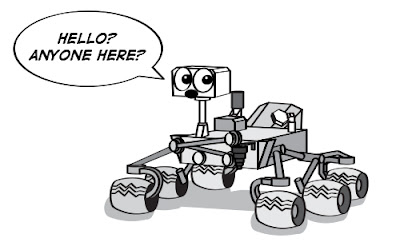This image shows a test rig that Eric is using to examine the feasibility of LCD contrast enhancement of images. Such a system might be useful for future spacecraft which often must acquire scientific photos under challenging lighting conditions.
by Eric Shear
Several months ago, I agreed to take on a
hands-on project for my masters’ thesis. I had been doing planetary mission
design and it seemed like a nice change to do something experimental that might
end up in future spacecraft cameras.
I picked up from where a former summer
undergraduate had left off. She, with John's help, had built and tested an
imager apparatus with a liquid crystal display (LCD) in front of a digital
camera. The whole assembly had additional optics to sharpen the image and was
bolted on a black aluminum bread-board (see the image above).
The goal was to make a sky imager that could
selectively block out the sun in order to increase contrast and dynamic range
in the image, allowing otherwise hard to see details to be easily picked out.
An obvious application would be on Mars, where there are high altitude cirrus
clouds that would be hard to see in bright daylight. The same thing could
be accomplished with a physical shade, but it would be heavier and less
flexible.

